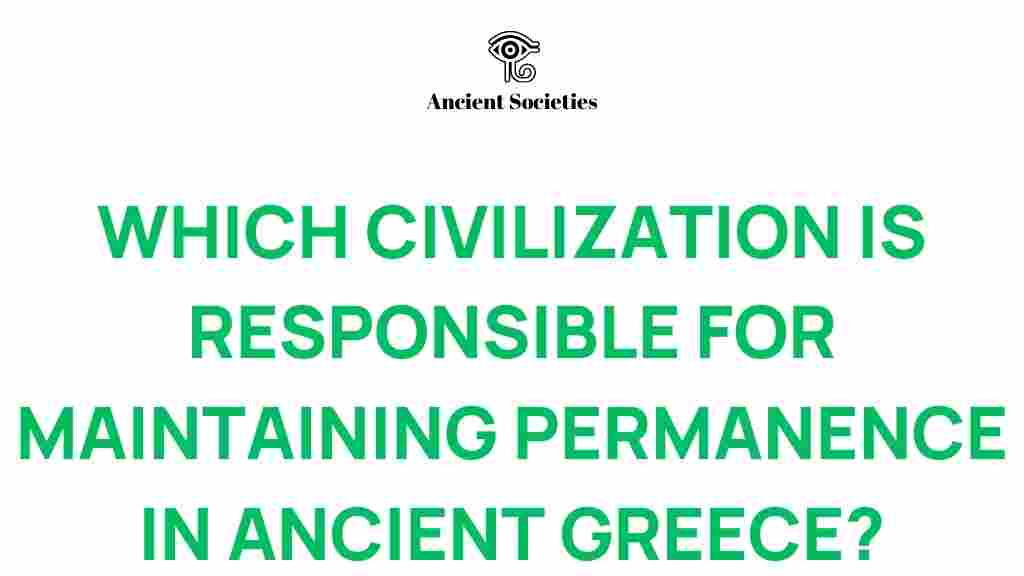Unraveling the Secrets of Ancient Greece: Who Preserved Its Legacy?
Ancient Greece is often hailed as the cradle of Western civilization, a place where remarkable advancements in philosophy, art, and democracy laid the foundations for modern society. The civilization thrived between the 8th and 6th centuries BC, and its legacy continues to influence contemporary culture and thought. But how did Ancient Greece achieve such permanence in its historical and cultural impact? This article delves into the preservation of Ancient Greece’s legacy through various means, including archaeology, literature, and the societal structures that emerged during its time.
The Significance of Ancient Greece in History
To understand the preservation of Ancient Greece, we must first appreciate its significance in history. This civilization was marked by:
- Innovative Philosophy: Thinkers like Socrates, Plato, and Aristotle shaped the way we understand ethics, politics, and knowledge.
- Art and Architecture: The aesthetic achievements, including the Parthenon and sculptures, set a standard for beauty that still resonates today.
- Democracy: The concept of democracy emerged in Athens, influencing governance systems worldwide.
- Literature and Theater: Works by Homer and the tragedies of Sophocles and Euripides laid the groundwork for Western literature.
These elements highlight why the preservation of Ancient Greece’s culture and legacy is vital for understanding the evolution of civilization.
How Ancient Greece’s Legacy Was Preserved
The preservation of Ancient Greece’s legacy can be attributed to several key factors:
1. Archaeology: Unearthing the Past
Archaeology has played a crucial role in uncovering the remnants of Ancient Greece. Through excavations and studies, archaeologists have revealed:
- Ruins of Ancient Cities: Sites like Athens, Delphi, and Olympia provide insights into the architectural prowess and urban planning of the time.
- Artifacts: Pottery, coins, and tools found in these locations help reconstruct daily life and societal norms.
- Inscriptions: Texts etched in stone, such as decrees and public records, offer a glimpse into the political and social structures of Ancient Greece.
These archaeological findings not only preserve the physical aspects of the civilization but also enable historians to piece together its cultural narrative.
2. Literature: The Written Word
Literature has been a cornerstone of preserving Ancient Greece’s legacy. Through various forms, including:
- Epic Poetry: Homer’s Iliad and Odyssey are not just stories; they encapsulate the values and beliefs of Ancient Greek society.
- Philosophical Texts: The works of Plato and Aristotle continue to be studied and debated, influencing philosophy and education.
- Historical Accounts: Historians like Herodotus and Thucydides documented events and societal changes, preserving the narrative of their time.
The written word allows successive generations to learn from the thoughts and experiences of the past, ensuring the permanence of Ancient Greek culture.
3. Education and Scholarship
The establishment of educational institutions in Ancient Greece, particularly in Athens, fostered a culture of learning that prioritized the study of history, philosophy, and the arts. Key aspects include:
- Academies: Institutions like Plato’s Academy and Aristotle’s Lyceum became centers for scholarly pursuit and debate.
- Preservation of Texts: The copying and dissemination of texts in the Hellenistic period ensured that works from Ancient Greece were available to future scholars.
- Influence on Roman Education: The Romans were heavily influenced by Greek education, further embedding Greek thought into Western civilization.
Education has been a vital mechanism for the preservation and propagation of Ancient Greek culture and ideas.
4. The Role of the Byzantine Empire
After the fall of the Western Roman Empire, the Byzantine Empire became a crucial custodian of Ancient Greek knowledge. Factors include:
- Continuation of Education: Byzantine scholars studied and copied Greek texts, ensuring that the knowledge of Ancient Greece was not lost.
- Translation Movement: The translation of Greek works into Arabic and Latin helped preserve and spread Ancient Greek thought.
- Art and Architecture: Byzantine art retained many elements of Greek styles, influencing the Renaissance and beyond.
The Byzantine Empire acted as a bridge, connecting the ancient world with the modern era.
Troubleshooting the Myths of Ancient Greece
While the preservation of Ancient Greece’s legacy is extensive, several myths and misconceptions persist. Here are some common issues and how to address them:
1. Myth: Ancient Greece Was a Monolith
Reality: Ancient Greece was a collection of city-states, each with its own culture and governance. Understanding this diversity is crucial when studying its legacy.
2. Myth: All Ancient Greek Culture Was Lost After Rome
Reality: Much of Ancient Greek culture was preserved and transformed during the Byzantine era and through the Renaissance, impacting various aspects of modern society.
3. Myth: Only Elite Classes Contributed to Greek Culture
Reality: While elite philosophers and artists are often highlighted, everyday citizens also played a role in the cultural fabric of Ancient Greece, particularly in festivals and local governance.
Addressing these myths helps to create a more nuanced understanding of Ancient Greece and its enduring legacy.
Conclusion: The Enduring Legacy of Ancient Greece
In summary, Ancient Greece has left an indelible mark on civilization through its profound contributions to philosophy, art, and governance. The preservation of its legacy has been achieved through:
- Archaeological discoveries that reveal the physical remnants of the past.
- Literary works that continue to inspire and educate.
- Educational systems that have integrated Greek thought into their curricula.
- The role of the Byzantine Empire in safeguarding Greek knowledge.
As we explore the secrets of Ancient Greece, we gain insight into the foundations of our own society. The permanence of its culture is a testament to the resilience of human thought and creativity. For those interested in learning more about Ancient Greece, visit this resource for in-depth studies. Additionally, you can explore ongoing archaeological efforts at this site.
Embracing the legacy of Ancient Greece is not just about admiring its past; it is about understanding how its principles continue to shape our present and future.
This article is in the category History and created by AncientSocieties Team
